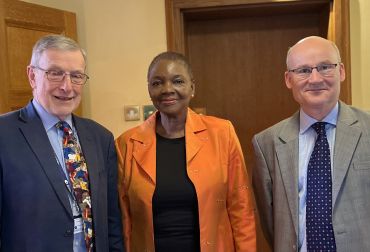Leaders of Britain's top Aid Agencies, as well as the government minister for development, Andrew Mitchell MP, gathered in Oxford's Nuffield College yesterday for a conference to debate the future of UK charities. The high-level debate followed yesterday's launch of a keynote report, calling on the third sector to take action to remain relevant and legitimate.
'Who do you think you are?', written by Professors Andrew Thompson and Mike Aaronson made tough reading for the assembled industry leaders, which included representatives from organisations including the British Red Cross and the Disasters Emergency Committee. The report pulls no punches, and asks about:
- Underlying assumptions and legitimacy of western International Non-Governmental Organisations
- Whether charities need to show they are fit for purpose - and can adapt
- The survival of INGOs - not an end in itself, according to the report
But, the report states, millions of people around the world need support and the INGOs' mission is too important for them to be allowed to fail. However, the report was very much the result of effective collaboration between the leadership of aid agencies and the Nuffield team.
The moral authority of NGOs is being challenged...Can you really claim to speak for the world's poorest now?
Describing the process as a journey, Professor Thompson thanked all those who had taken part in the workshops, survey and seminars - and particularly the Arts and Humanities Research Council, which provided the funding for the project. He added, 'We were really grateful for the candour and clarity everyone gave. It enabled us to think through together the challenges facing NGOs. It was our report, but it was based on dialogue.'
 Left to right, Prof. Mike Aaronson, Baroness Amos and Prof Andrew Thompson, at Nuffield College's charities conference on 6 July 2023.
Left to right, Prof. Mike Aaronson, Baroness Amos and Prof Andrew Thompson, at Nuffield College's charities conference on 6 July 2023.Calling on the Aid Agency leaders present to take the report and talk together about their organisation's positions, Professor Thompson handed over to his co-author Professor Aaronson, formerly of Save the Children. He explained the report had three key roles, discussion of legacy, legitimacy and leading into the future.
'The moral authority of NGOs is being challenged,' he said to the assembled charity bosses. 'Can you really claim to speak for the world's poorest now?'
He added, 'My ambition, my hope, is that every organisation will read this report and ask what this means for us. Are there things we need to do?'
This question, along with the three key issues, needs to be addressed, Professor Aaronson maintained.
Chairing the conference, Baroness [Valerie] Amos, the former Development Minister, is the head of Oxford's University College and has been closely involved in the process. She called for the industry leaders to address key concerns.
There is a route back, for the industry...But we have to recognise that not all the moral authority rests here
From the floor, questions were raised about the way to adapt and face the future - in particular localism (working with agencies on the ground).
Baroness Amos said, 'It's important just to start - develop partnerships. Year on year, it will get better. But it means preparing for change. We can learn from change and mistakes and we need to be quite humble.'
One leader raised the issue of the use of taxpayers' money - and the increased scrutiny faced by charities. Another issue was perceived to be maintaining public trust and support, while under such a spotlight. Baroness Amos maintained, 'We have seen public support leach away. Are there ways of regaining trust?'
There is an amazing response to appeals. British people are still very generous. We shouldn't lose sight of that.
Concentrating on the core values at the heart of organisations is essential, according to one expert, 'There is an amazing response to appeals. British people are still very generous. We shouldn't lose sight of that. People don't want to hear about money - they want to hear about outcomes - what has been achieved.'
'There is a route back, for the industry,' he maintained. 'But we have to recognise that not all the moral authority rests here.'
Meanwhile, another charity leader raised the issue of pooling and collaboration - rather than the sector competing, 'We still see big charities competing. We need to do better and break down this competitive model….we need ideas for how to do that.'






